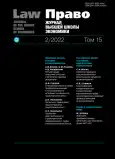Legal Status of Issuers of Crypto Assets in the Light of the Project of MICA Regulation
- Authors: Daudrikh Y.1
-
Affiliations:
- Comenius University in Bratislava
- Issue: Vol 15, No 2 (2022)
- Pages: 244-263
- Section: Law in the Modern World
- URL: https://journal-vniispk.ru/2072-8166/article/view/318183
- DOI: https://doi.org/10.17323/2072-8166.2022.2.244.263
- ID: 318183
Cite item
Full Text
Abstract
In the developing world of modern digital technologies, the question arises of the need to adopt a uniform mechanism of the regulation of crypto-assets issuers, including a comprehensive regulation of the position of all entities involved in the trade in crypto-assets. However, we are currently examining the inconsistent and abstract regulation of the main crypto-assets traders resulting from Directive (EU) 2018/843 of the European Parliament and of the Council of 30 May 2018 amending Directive (EU) 2015/849 on the prevention of the use of the financial system for the purposes of money laundering or terrorist financing, and amending Directives 2009/138/EC and 2013/36/EU. Under pressure from policy makers and the professional public, the European Commission has presented a proposal for a longawaited Proposal for a Regulation of the European parliament and of the Council on Markets in Crypto-assets, and amending Directive (EU) 2019/1937, COM (2020) 593 final (MICA) to ensure common regulation of crypto-assets, which is applicable in all Member States of the European Union. The present proposal for a MICA regulation has the ambition to unify the fragmented legislation on crypto-assets that nowaday as a result of lack of wider regulation at EU level. The primary goal of this paper is to analyze newly defined concepts, including categorizations of crypto-assets falling under MICA. In this context, the basic aspects of the functioning of the crypto-assets issue process, including the obligation to publish a white paper, are examined. In particular, the position of the EBA (European Banking Authority) as a supervisory authority for issuers of significant crypto-assets is examined. Based on the analysis, the author comes to the conclusion that the application of the MICA may well be associated with a number of problems, which are then specified in more detail. We see ambiguity when applying MICA caused, for example, by rather general language of the terms defining crypto-assets, or by absence of further explanation of cooperation process between relevant EU and third country authorities. The several scientific methods were used in writing this paper, such as: comparison, analysis, synthesis, analogy, induction and deduction.
About the authors
Yana Daudrikh
Comenius University in Bratislava
Author for correspondence.
Email: noreply@hse.ru
ORCID iD: 0000-0003-1297-5967
Assistant Professor, Leading Researcher, Department of Financial Law, PhD, JUDr Assistant Professor, Leading Researcher, Department of Financial Law, PhD, JUDr. (Slovak Republic)
References
- Blandin A., Cloots A. et al. (2019) Global Cryptoasset Regulatory Landscape Study. Cambridge: University Press, 122 p. DOI: https://doi.org/10.2139/ssrn.3379219
- Bočánek M. (2021) First Draft of Crypto-Asset Regulation (MiCA) with the European Union and Potential Implementation. Financial Law Review, issue 22, pp. 37-53. DOI: https://doi.org/10.4467/22996834FLR.21.011.13979
- Burilov V. (2019) Regulation of Crypto Tokens and Initial Coin Offerings in the EU de lege lata and de lege ferenda. European Journal of Comparative Law and Governance, vol. 6, pp. 146-186. DOI: https://doi.org/10.1163/22134514-00602003
- Irwin A., Turner A. (2018) Illicit Bitcoin transactions: challenges in getting to who, what, when and where. Journal of Money Laundering Control, vol. 21, no. 3, pp. 297-313. DOI: https://doi.org/10.1108/JMLC-07-2017-0031
- Ferrari V. (2020) The regulation of crypto-assets in the EU — investment and payment tokens under the radar. Maastricht Journal of European and Comparative Law, vol. 27, pp. 325-342. DOI: https://doi.org/10.1177/1023263X20911538
- Ferreira A., Sandner P., Dünser T. (2021) Cryptocurrencies, DLT and crypto assets: the road to regulatory recognition in Europe. Available at: https://ssrn.com/abstract=3891401 (дата обращения: 09.10.2021) DOI: https://doi.org/10.2139/ssrn.3891401
- Hobza M. (2021) Challenges of Law in Business and Finance. 13th International Scholar Conference “Law in Business of Selected Member States of the European Union”. Prague: TROYAS, pp. 13-22.
- Hornuf L., Kück T., Schwienbacher A. (2021) Initial coin offerings, information disclosure, and fraud. CESifo Working Paper No. 7962. Germany: Munich Society for the Promotion of Economic Research — CESifo GmbH, pp. 1-46.
- Houben R., Snyers A. (2018) Cryptocurrencies and blockchain. Legal context and implications for financial crime, money laundering and tax evasion. Brussels: European parliament, Policy Department for Economic, Scientific and Quality of Life Policies, 101 p.
- Moreno S., Seigneur J., Gotzev G. (2020) Handbook of Research on Cyber Crime and Information Privacy. Hershey: Information Science Reference, 400 p.
- Sidak M., Slezáková A. (2014) Regulácia a dohl’ad nad činnosťou subjektov finančného trhu. Bratislava: Wolters Kluwer, 238 p. (In Slovak)
- Winkler M. (2004) Legal aspects of conducting business by Slovak banks within the common market of the EU (on the example of the Czech Republic). Business Entrepreneurship and Marketing in the New European Economic Area: Almanac of an International Conference on the Occasion of the 35th Anniversary of the Faculty of Business held under the auspices of the Deputy Prime Minister of the Slovak Republic Ivan Mikloš. Bratislava: EKONÓM, pp. 703-710.
- Winkler M. (2018) Regulation of deadlines for issuing decisions in proceedings conducted pursuant to the Financial Market Supervision Act. Law governing conducting business in selected member states of the European Union. International Conference. Law governing conducting business in selected member states of the European Union. Almanac of the 10th International Scholar Conference. Prague: TROAS, pp. 277-284.
- Zetzsche D., Arner D., Buckley R. (2020) Decentralized Finance. Journal of Financial Regulation, vol. 6, issue 2, pp. 172-203. DOI: https://doi.org/10.1093/jfr/fjaa010
- Zetzsche D., Arner D., Buckley R. (2020) The evolution and future of data-driven finance in the EU. Common Market Law Review, vol. 57, issue 2, pp. 331-360. DOI: https://doi.org/10.54648/COLA2020030
- Zetzsche D., Arner D., Buckley R., Annunziata F. (2021) The Markets in Crypto-Assets regulation and the EU digital finance strategy. Capital Markets Law Journal, vol. 16, issue 2, pp. 203-225. DOI: https://doi.org/10.1093/cmlj/kmab005
Supplementary files








